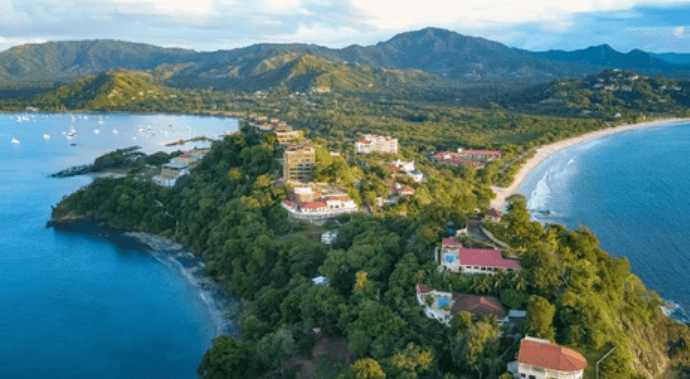- Posted by: Sebastian P
Corporate Costa Rica Leisure August 17th 2025
Costa Rica is set to introduce a significant change for property owners and hosts who rent out their properties on platforms like Airbnb. Starting in 2026, a 12.75% tax on gross rental income will be enforced.
This new tax policy aims to regulate the short-term rental market and generate revenue. Property owners and hosts will need to adapt to this change, understanding its implications on their rental income.
The introduction of this tax reflects a broader trend in regulating the sharing economy. It is crucial for those affected to stay informed about the upcoming changes.
Key Takeaways
- Costa Rica will enforce a 12.75% tax on Airbnb rentals starting in 2026.
- The tax applies to the gross rental income from short-term rentals.
- Property owners and hosts must understand the implications of this tax.
- The tax aims to regulate the short-term rental market.
- Staying informed about the tax policy is crucial for those affected.
Understanding Costa Rica’s New 12.75% Airbnb Tax Coming in 2026
Starting in 2026, Costa Rica will implement a new 12.75% tax on short-term rentals through platforms like Airbnb. This change is set to impact the vacation rental market significantly. The new tax applies to rentals under 30 days and will be enforced through major booking platforms.
Key Details of the New Vacation Rental Tax
The new 12.75% tax rate will be applied to the gross rental income of short-term vacation rentals. This means that hosts will need to factor this additional cost into their pricing strategies. The tax is designed to generate revenue for the government while regulating the rapidly growing vacation rental market.
Property Types Affected by the Tax
The tax will apply to various types of properties used for short-term rentals, including houses, apartments, and condos. Any property rented for less than 30 days will be subject to the 12.75% tax. This broad application ensures that all short-term rental income is captured under the new tax regulation.
Implementation Timeline and Key Dates
The new tax is set to take effect in 2026, giving hosts and property managers a year to adjust their pricing and compliance strategies. Key dates to note include the registration deadline for hosts and the start of tax collection. Hosts are advised to stay informed about these dates to avoid any penalties.
The Current Vacation Rental Tax Landscape in Costa Rica
Understanding the current tax landscape is crucial for Airbnb hosts in Costa Rica. The country’s vacation rental market is subject to specific tax regulations that hosts must comply with.
Existing Tax Structure for Tourism Properties
Currently, rental income is taxed under the Real Estate Capital Gains Tax system. This system assumes 15% of expenses and taxes the remaining 85% at 15%. This means that the effective tax rate on rental income is 12.75% (15% of 85%). This tax structure is applicable to various tourism properties, including vacation rentals.
How Airbnb and VRBO Properties Are Currently Taxed
Airbnb and VRBO properties in Costa Rica are subject to the same Real Estate Capital Gains Tax system. Hosts are required to report their rental income and comply with the existing tax regulations. It is essential for hosts to maintain accurate records of their income and expenses to ensure compliance and to take advantage of the allowable deductions.
By understanding the current tax landscape, hosts can better navigate the upcoming changes and plan accordingly. Staying informed about the Airbnb tax regulations and Costa Rica tax update will help hosts adapt to the new tax structure coming in 2026.
Why Costa Rica Is Implementing the New Tax
Costa Rica’s introduction of a new tax in 2026 marks a significant shift in its approach to vacation rentals. The government aims to increase revenue and regulate the growing vacation rental market. This move is part of a broader strategy to manage the impacts of tourism on local infrastructure and communities.
Government Revenue Objectives
The new tax is expected to generate substantial revenue for the government. This additional income will be crucial for funding public services and infrastructure projects that benefit both locals and tourists. By increasing revenue, the government can improve the overall quality of life and enhance the tourist experience.
Infrastructure and Tourism Development Goals
A significant portion of the tax revenue will be allocated towards improving infrastructure in tourist areas. This includes upgrading transportation networks, enhancing public amenities, and promoting sustainable tourism practices. By investing in infrastructure, Costa Rica can support its growing tourism industry while maintaining its natural beauty and appeal.
Addressing the Rapid Growth of Vacation Rentals
The rapid expansion of vacation rentals has brought both opportunities and challenges to Costa Rica. The new tax aims to regulate this market, ensuring that it contributes fairly to the local economy. By addressing the growth of vacation rentals, the government can mitigate potential negative impacts on housing availability and local communities.
Breakdown of the 12.75% Tax Structure
As Costa Rica gears up to implement a 12.75% tax on Airbnb and other vacation rentals, it’s essential to dissect its components and implications. This new tax is set to significantly impact the vacation rental market, affecting both property owners and travelers.
Components and Allocation of the Tax Rate
The 12.75% tax rate is composed of several components, each allocated to different areas of Costa Rica’s tourism infrastructure and public services. The breakdown includes:
| Tax Component | Percentage | Allocation |
| Tourism Development | 5% | Funding for tourism development projects |
| Public Services | 4% | Enhancing public services for tourists |
| Infrastructure | 3.75% | Improving infrastructure in tourist areas |
Collection Methods and Payment Processes
The new tax will be collected through platforms like Airbnb and Vrbo, making it easier for property owners to comply. The collection process will be integrated into the existing payment systems, ensuring a seamless experience for hosts and guests.
Key aspects of the collection method include:
- Automated tax collection through booking platforms
- Regular remittance of collected taxes to government coffers
- Detailed reporting for transparency and compliance
Enforcement Mechanisms and Penalties
To ensure compliance, Costa Rica has established robust enforcement mechanisms and penalties for non-compliance. Property owners and platforms are required to adhere strictly to the tax regulations to avoid fines and other penalties.
Penalties for non-compliance may include:
- Fines ranging from $100 to $500 for initial non-compliance
- Repeated offenses may lead to higher fines and potential revocation of rental permits
How the Tax Compares to Other Popular Tourist Destinations
The new Airbnb tax in Costa Rica has sparked interest in how other tourist hotspots are handling vacation rental taxation. As travelers and hosts look to understand the implications of this 12.75% tax, comparing it to similar taxes in other popular destinations can provide valuable insights.
Vacation Rental Taxes in Mexico and the Caribbean
Mexico and various Caribbean islands have implemented their own vacation rental taxes. For instance, Mexico charges a 2% tax on lodging services, while the Bahamas have a 3% tax on accommodations. These rates are significantly lower than Costa Rica’s new tax.
- Mexico: 2% lodging tax
- Bahamas: 3% accommodations tax
- Jamaica: 7.5% tax on accommodations and other tourist services
Comparison with European Vacation Rental Taxes
European countries have a wide range of vacation rental taxes. For example, Spain charges a 4% tourist tax, while Italy has a range of taxes from 4% to 7% depending on the region. These taxes are generally lower than Costa Rica’s 12.75% rate.
Key European vacation rental taxes:
- Spain: 4% tourist tax
- Italy: 4% to 7% regional tax
- France: 0.2% to 0.5% lodging tax
Global Trends in Airbnb Taxation
There’s a growing trend worldwide towards taxing vacation rentals. Countries are recognizing the potential revenue from taxing short-term rentals, and many are implementing or increasing these taxes. Costa Rica’s new tax is part of this global movement.
Notable trends include:
- Increasing tax rates on vacation rentals
- Implementation of new taxes in previously untaxed regions
- Stricter enforcement and collection mechanisms
Impact on Property Owners and Hosts
As Costa Rica gears up for the 2026 introduction of its new Airbnb tax, property owners and hosts must prepare for the financial implications. The new 12.75% tax on vacation rentals will undoubtedly affect their bottom line, but understanding the specifics can help mitigate the impact.
Financial Implications for Rental Businesses
The additional tax burden will require property owners and hosts to reassess their pricing strategies and profit margins. It’s essential to consider how the new tax will affect their overall financial situation.
Profit Margin Considerations
Property owners should analyze their current profit margins and determine how to adjust their pricing to maintain profitability. This might involve absorbing some of the tax costs or passing them on to guests. As Airbnb tax regulations come into effect, hosts must be strategic about their pricing.
Tax Deduction Possibilities
It’s also crucial for property owners to explore potential tax deductions that might offset some of the new tax costs. Consulting with a tax professional can help identify eligible deductions and ensure compliance with the new regulations.
Reporting Requirements and Compliance Steps
To comply with the new 2026 tax changes Costa Rica, property owners and hosts will need to understand the reporting requirements. This includes registering for the appropriate tax identifiers and filing regular tax returns. Failure to comply could result in penalties, so it’s vital to stay informed and seek professional advice if necessary.
Property owners should maintain accurate records of their rental income and expenses to facilitate tax reporting. This will not only ensure compliance but also help in making informed decisions about their rental businesses.
Potential Exemptions and Special Cases
While the new tax will apply to most vacation rentals, there may be exemptions or special cases to consider. For instance, long-term rentals or properties used for specific purposes might be treated differently under the new tax regulations. Property owners should investigate whether they qualify for any exemptions or special treatment.
As the implementation date approaches, staying informed about the Airbnb tax regulations and any updates to the tax law will be crucial for property owners and hosts to navigate the changes successfully.
What American Travelers Should Expect
As the new Airbnb tax in Costa Rica approaches, American travelers need to be prepared for changes in their vacation rental expenses. The introduction of a 12.75% tax on vacation rentals is expected to impact the cost of accommodations for travelers.
Projected Price Increases for Vacation Rentals
The new tax will likely lead to increased prices for vacation rentals in Costa Rica. According to industry estimates, the average price increase could range from 8% to 12%. To give you a better idea, here’s a breakdown of potential price increases for different types of accommodations:
| Accommodation Type | Average Price (2025) | Projected Price (2026) | Percentage Increase |
| Studio Apartment | $80 | $90 | 12.5% |
| 1-Bedroom Villa | $150 | $165 | 10% |
| 3-Bedroom House | $300 | $336 | 12% |
Budgeting for Your Post-2026 Costa Rica Trip
To prepare for the potential price increases, American travelers should consider budgeting extra for their accommodations. Here are some tips:
- Research and book accommodations early to secure better rates.
- Consider alternative accommodation options, such as hotels or vacation rentals outside of popular areas.
- Factor in the additional cost of the new tax when planning your trip.
How to Find the Best Value Despite the New Tax
Despite the new tax, American travelers can still find great value in Costa Rica’s vacation rentals. To maximize your budget, consider the following strategies:
- Look for longer-term rentals, which may offer better value.
- Explore different regions of Costa Rica, as prices can vary significantly.
- Negotiate with property owners or managers for better rates.
Preparing Your Costa Rican Rental Property for the Tax Change
Preparing for the upcoming Airbnb tax change in Costa Rica is crucial for property owners. As the 2026 deadline approaches, it’s essential to understand how to adjust your rental property strategies to comply with the new regulations.
Adjusting Your Pricing Strategy
With the introduction of the new 12.75% tax, property owners will need to reassess their pricing to maintain profitability. Consider the following adjustments:
- Review your current pricing model and adjust rates accordingly to absorb the tax increase.
- Analyze competitor pricing to remain competitive in the market.
- Consider offering seasonal promotions or discounts to attract guests.
Documentation and Compliance Preparation
To comply with the new tax regulations, property owners must ensure they have the necessary documentation. This includes:
| Document Type | Description | Required By |
| Tax Registration | Register your property for tax purposes | January 2026 |
| Financial Records | Maintain detailed financial records of rental income | Ongoing |
| Guest Information | Keep records of guest stays and payments | Ongoing |
Communicating Changes to Your Guests
Transparent communication with your guests is key. Clearly explain the tax changes and how they affect booking costs. Consider:
- Updating your booking policies to reflect the new tax.
- Notifying guests in advance of the tax change and its impact on their booking.
- Providing excellent customer service to maintain a positive reputation.
Alternative Accommodation Options and Their Tax Implications
Costa Rica’s new tax on vacation rentals has sparked interest in other accommodation choices. As travelers and property owners navigate the implications of the 12.75% tax on Airbnb rentals, alternatives such as hotels, resorts, and long-term rentals are becoming more attractive.
Hotels and Resorts vs. Vacation Rentals
Hotels and resorts offer a different experience compared to vacation rentals, with services like daily housekeeping, on-site dining, and recreational facilities. The tax implications for hotels and resorts differ from those for vacation rentals. While hotels are subject to existing tourism taxes, vacation rentals are now facing the additional 12.75% tax.
| Accommodation Type | Tax Treatment |
| Hotels and Resorts | Subject to existing tourism taxes |
| Vacation Rentals | Subject to 12.75% tax on rentals |
Long-term Rentals and Different Tax Treatments
Long-term rentals are treated differently under Costa Rica’s tax regulations. These rentals are not subject to the 12.75% tax, making them an attractive option for those planning extended stays. However, long-term rentals are subject to other regulations and taxes, such as income tax on rental income.
Potential Economic Effects on Costa Rica’s Tourism Industry
As Costa Rica gears up to implement a new tax on vacation rentals, the potential economic impacts on its tourism industry are being closely examined. The introduction of a 12.75% tax on Airbnb rentals is expected to have both immediate and long-term effects on the economy.
Short-term Impact on Visitor Numbers and Spending
In the short term, the new tax may deter some visitors, potentially leading to a slight decrease in tourist numbers. This could impact local businesses that rely heavily on tourism, such as restaurants, tour operators, and souvenir shops. Key concerns include:
- Increased costs for travelers
- Potential shift to alternative destinations
- Impact on last-minute bookings
Long-term Benefits for Infrastructure and Services
On the other hand, the revenue generated from the new tax is expected to be reinvested in tourism infrastructure and services, potentially enhancing the overall tourist experience. This could lead to:
- Improved transportation networks
- Enhanced tourist facilities
- Better maintenance of natural attractions
Effect on Local Real Estate and Rental Markets
The new tax may also influence the local real estate and rental markets. Property owners might need to adjust their pricing strategies or explore alternative rental options. Key considerations include:
- Potential decrease in rental income for property owners
- Shift towards long-term rentals
- Increased competition in the hotel industry
Conclusion: Planning Your Costa Rican Experience in the New Tax Era
As Costa Rica introduces a new 12.75% Airbnb tax in 2026, travelers and property owners must adapt to the changing vacation rental landscape. Understanding the implications of this tax is crucial for planning a seamless Costa Rican experience.
The new tax will impact vacation rental prices, but with proper planning, you can still enjoy the beauty and charm of Costa Rica. Property owners should adjust their pricing strategies and ensure compliance with the new regulations to maintain their competitiveness in the market.
For travelers, budgeting for the increased costs and exploring alternative accommodation options can help mitigate the effects of the new tax. By staying informed about the changes and adapting your plans accordingly, you can continue to enjoy all that Costa Rica has to offer.
As the tourism industry in Costa Rica evolves, staying up-to-date on the airbnb tax and vacation rentals tax will be essential for making the most of your Costa Rican experience.
FAQ
What is the new Airbnb tax rate in Costa Rica?
The new Airbnb tax rate in Costa Rica is 12.75%, which will be implemented in 2026.
How will the 12.75% tax be collected?
The 12.75% tax will be collected through Airbnb, and the platform will be responsible for remitting the tax to the Costa Rican government.
What types of properties are affected by the new tax?
The new tax will apply to all vacation rentals, including those listed on Airbnb, VRBO, and other platforms, as well as properties rented directly to tourists.
Are there any exemptions to the new tax?
While the specifics of exemptions are still being finalized, it’s expected that certain types of long-term rentals or properties used for specific purposes may be exempt from the tax.
How will the new tax affect my vacation rental business in Costa Rica?
Property owners and hosts will need to adjust their pricing strategies to account for the new tax, and may need to comply with additional reporting requirements.
Will the new tax apply to bookings made before 2026?
The new tax will likely apply to bookings made after the implementation date in 2026, but the specifics may depend on the exact implementation timeline.
How will the Costa Rican government use the revenue generated from the new tax?
The revenue generated from the new tax is expected to be used for infrastructure development, tourism promotion, and other initiatives to support the tourism industry.
Can I still rent out my property on Airbnb in Costa Rica after the new tax is implemented?
Yes, you can still rent out your property on Airbnb, but you’ll need to comply with the new tax regulations and adjust your pricing accordingly.
Are there alternative accommodation options available in Costa Rica that won’t be subject to the new tax?
Yes, hotels, resorts, and long-term rentals may be alternative options, but their tax implications may vary, and it’s essential to understand these differences.
How will the new tax affect the overall cost of my trip to Costa Rica?
The new tax may result in higher costs for vacation rentals, but travelers can expect to see more infrastructure development and improved services, which may enhance their overall experience.
What can property owners do to prepare for the new tax?
Property owners can start adjusting their pricing strategies, ensure they have the necessary documentation, and communicate changes to their guests to prepare for the new tax.
Even as new taxes and regulations reshape global short-term rental markets, one thing remains constant — trust and transparency always pay off.
At BRnX Travel, we don’t just verify listings; we accredit them.
We uphold the INACHI and ISO standards of verification and accreditation, setting the benchmark for what it means to operate a truly verified property.
For hosts, that means peace of mind, compliance, and credibility that keeps bookings strong — even under new tax policies.
For travelers, it means assurance that every stay is accurately represented, legally compliant, and worthy of your trust.
Verified. Accredited. Trusted.
That’s what keeps revenue flowing, even when the rules change.






